ISLAMABAD: The Pakistan Medical Association (PMA) warned on Tuesday that the government’s decision to allow indoor dinning and marriages at restaurants and wedding halls for vaccinated people from next month could lead to a fourth coronavirus wave in the first week of August, following the religious Eid Al-Adha holiday.
The country’s pandemic response body, the National Command and Operation Center (NCOC), on Monday announced that indoor dining at restaurants would be allowed in the country from July 1, though at 50 percent occupancy and only for vaccinated individuals.
“Restaurants and hotels management will institute mechanism for checking of vaccination certificates of guests and will also ensure vaccination of respective management and staff,” the NCOC said in a statement on Monday. “Takeaways are allowed 24/7.”
Likewise, indoor marriages have also been allowed for vaccinated individuals with a maximum limit of 200 guests.
Other than that, the authorities have permitted cinemas to reopen “with strict COVID protocols for vaccinated individuals.”
Medical professionals have, however, raised questions regarding the mechanism to implement the directives for restaurants, cinemas and marriage halls to only serve vaccinated people.
“Every time our number of cases start going down, we become complacent and reopen everything, which leads to another wave,” Dr. Qaisar Sajjad, secretary general of the Pakistan Medical Association, told Arab News on Tuesday.
“The [COVID-19] vaccination rate is slow across the country, and we can face another wave in the first week of August, after Eid Al-Adha,” he said, urging people to get vaccinated at the earliest to protect themselves from the virus.
Restaurants and hotel managements say they don’t have the capacity to check vaccination certificates of guests before serving them, demanding the government devise a mechanism for this.
“It’s good for our industry that the government has allowed indoor dinning for vaccinated people, but how can we check and verify the vaccine certificates of individuals?” said Athar Sultan Chawla, convener of the All Pakistan Restaurants Association, while talking to Arab News.
He said NCOC officials, in a meeting with the restaurants association last week, promised to provide a mobile app for each restaurant, hotel and wedding hall manager to check and verify vaccination certificates.
“We hope the NCOC will provide us with the promised app, otherwise we will not be able to do it on our own,” he said. “Apart from that, the provincial governments have yet to issue separate notifications for easing of the coronavirus restrictions.”
Federal and provincial health authorities did not respond to phone calls and text messages seeking their viewpoint regarding the mechanism to ensure implementation of the new guidelines.
NCOC chief Asad Umar already warned of a new COVID-19 wave in July if people fail to follow health guidelines like wearing face masks and getting shots.
The third COVID-19 wave set in in Pakistan in March, forcing the government to impose virus restrictions across the country. This led to a decline in infection rates by May, leading the NCOC to begin easing curbs from June 15.
The South Asian nation of 220 million has administered 15.6 million COVID-19 doses since February when it started the inoculation drive and is planning to vaccinate at least 70 million people to achieve herd immunity.
The NCOC said in a statement earlier in the day that the country was going to receive three million doses of SinoVac vaccine from China on Tuesday through a procurement plan for June.
Pakistan has so far received 21.13 million doses of different types of vaccines, out of which over 17 million doses are procured on payment, the NCOC said.
The government has also allocated $1.2 billion for further purchase of COVID-19 vaccines during the coming fiscal year.
Pakistani doctors warn of fourth COVID-19 wave after Eid Al-Adha as restrictions lifted
https://arab.news/49s2x
Pakistani doctors warn of fourth COVID-19 wave after Eid Al-Adha as restrictions lifted
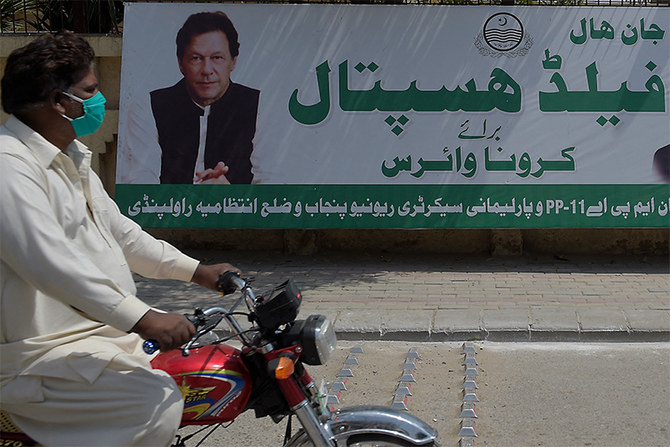
- Pakistan Medical Association laments complacency every time infections begin to fall, which causes a new wave
- Restaurants and hotel managements say don’t have capacity to check vaccine certificates, demand government devise a mechanism
Pakistani forces kill 6 militants in volatile northwest near Afghanistan— army

- Pakistani security forces carry out twin raids in Dera Ismail Khan, North Waziristan districts
- Such operations are often conducted against Pakistani Taliban or Tehreek-e-Taliban Pakistan group
PESHAWAR, Pakistan: Pakistani security forces killed six militants in twin raids Wednesday targeting their hideouts in the country’s volatile northwest region bordering Afghanistan, the military said.
Five militants were killed in the first raid in Dera Ismail Khan district in Khyber Pakhtunkhwa province, the military said in a statement. It did not provide further details about the slain insurgents, and only said the men were behind various previous attacks on the security forces.
Another militant was killed in the second raid in a former stronghold of the Pakistani Taliban in the North Waziristan district in the northwest.
The statement did not provide any further details about the identity of the slain men.
Such operations often target the Pakistani Taliban, which has been emboldened by the Taliban takeover of Afghanistan in 2021. Known as the Tehreek-e-Taliban Pakistan or TTP, it is a separate group but a close ally of the Afghan Taliban.
Pakistan hikes electricity prices by Rs2.83 per unit citing fuel cost adjustment
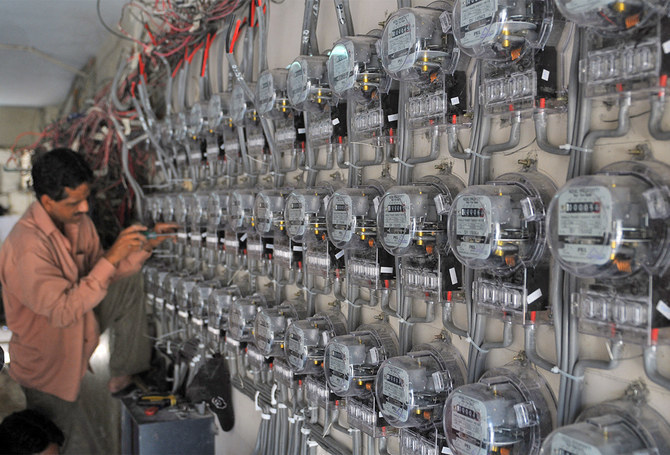
- Fuel cost adjustment for March to reflect in consumers’ bills for the month of May, says power regulator
- Pakistan has been caught in a high inflationary cycle since April 2022 due to surging food and fuel prices
ISLAMABAD: Pakistan’s National Electric Power Regulatory Authority (NEPRA) on Wednesday authorized distribution companies to levy a Rs2.83 per unit additional charge on consumers’ bills for May, with the move likely to fuel inflation in a country already suffering an economic crisis.
A notification by NEPRA seen by Arab News stated that the fuel cost adjustment pertains to March, adding that the additional charges would apply to all consumer categories except “Electric Vehicle Charging Stations (EVCS) and lifeline consumers.”
“The said adjustment shall be shown separately in consumers’ bills on the basis of units billed to the consumer in the month of March 2024,” the notification said.
Pakistan has been caught in a high inflationary spiral since April 2022, with the highest-ever inflation rate recorded at 38 percent in May 2023. The government credits soaring inflation to painful decisions it had to take to meet conditions for an International Monetary Fund (IMF) bailout program, including hiking energy tariffs and fuel prices.
Gas and electricity rates were hiked by 318.7 percent and 73 percent respectively in a year, according to official data.
The price hikes come as Pakistan is set to begin discussions with the IMF this month over a new multi-billion-dollar loan agreement after completing its nine-month, $3 billion loan arrangement with the lender.
Under the last IMF bailout, Pakistan was told to prevent further accumulation of circular debt in its power sector, arising from subsidies and unpaid bills. For a new program, the South Asian nation will need to implement reforms to reduce costs by improving electricity transmission and distribution, moving captive power into the grid, improving governance, and combating theft.
It will also have to maintain power and gas tariffs at levels that ensure cost recovery, with adjustments made to safeguard the financially vulnerable, through existing progressive tariff structures.
Senior World Bank official concludes Pakistan trip after discussing reforms with officials
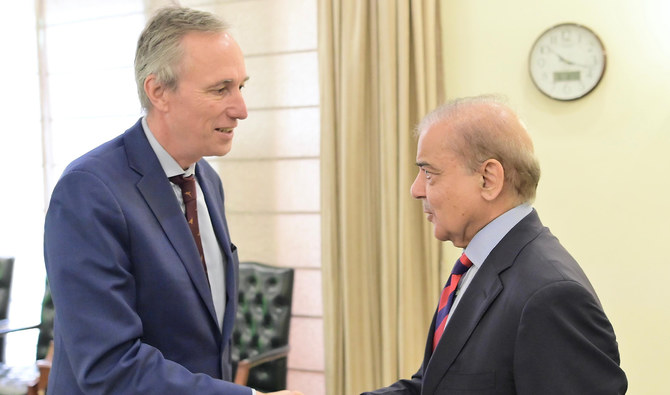
- World Bank Vice President for South Asia Martin Raiser meets PM Sharif, key officials in Islamabad
- Raiser praises Pakistan’s reform plans to boost growth, attract private investment and tackle poverty
ISLAMABAD: A senior World Bank official concluded his three-day visit to Pakistan on Wednesday, holding discussions with Prime Minister Shehbaz Sharif and key government ministers on Islamabad’s fiscal and economic reforms, a statement from the international institution said.
World Bank Vice President for South Asia Martin Raiser arrived in the federal capital on May 6, with his visit taking place as Pakistan faces a chronic balance of payment crisis, forcing it to turn to the International Monetary Fund (IMF) for a new long-term bailout deal.
Pakistan has faced the challenges of revenue generation and government expenditure in the past and struggled with high levels of debt, a large fiscal deficit and an ongoing need for structural reforms to improve its fiscal sustainability.
“The World Bank Vice President for South Asia, Martin Raiser, concluded his three-day visit to Pakistan today and reaffirmed the World Bank’s support to stabilize the economy and accelerate inclusive and resilient growth,” a press release by the international institution read.
It said Raiser met Sharif, ministers of finance, water, power, energy, and petroleum, and his counterparts to discuss Pakistan’s development priorities.
“The discussions focused on economic and fiscal reforms, human capital development, adaptation to climate change, energy sector reforms, and digitalization as a foundational enabler and accelerator of development,” the World Bank added. \
Raiser said he was pleased to learn of Pakistan’s reform plans to boost growth and attract private investment, strengthen climate resilience, and invest in human capital to tackle daunting challenges such as child stunting and poverty.
The World Bank official also visited Pakistan’s northwestern Khyber Pakhtunkhwa (KP) province to meet Chief Minister Ali Amin Gandapur.
“Discussions focused on the provincial developmental priorities and how can the World Bank step up its support in key sectors, like education, water and sanitation, health, rural roads, and livelihoods,” the statement said.
He also attended a national conference on education in Islamabad, where PM Sharif also spoke. Raiser reaffirmed the World Bank’s commitment to urgent action to tackle the large number of out-of-school children in Pakistan.
PM Sharif declares ‘education emergency’ across Pakistan to enroll out-of-school children
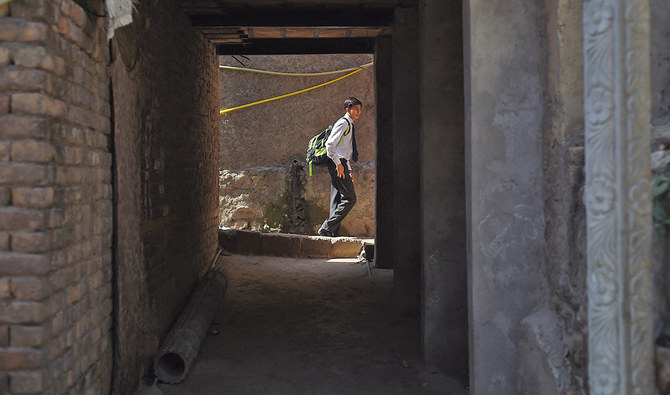
- Pakistan has one of the world’s highest out-of-school children population at 26.2 million
- PM Shehbaz Sharif says will personally oversee the national program to ensure its success
ISLAMABAD: Prime Minister Shehbaz Sharif on Wednesday declared an “education emergency” across Pakistan on Wednesday, vowing to personally oversee the program which he hoped would enroll over 26.2 million out-of-school children in educational institutions.
Pakistan has the second-highest population of out-of-school children in the world at 26.2 million, according to Unicef Pakistan. Pakistani experts have identified population growth, lack of localized strategies, and economic issues as the main reasons why over 26 million Pakistani children are not enrolled in schools across the country.
A report by Pakistan’s education ministry in January revealed that out of 26.2 million out-of-school children, 11.73 million are in Punjab, 7.63 million in Sindh, 3.63 million in Khyber Pakhtunkhwa (KP) and 3.13 million in Balochistan province.
Speaking at an event titled “National Conference on Education Emergency,” Sharif said enrolling millions of children back into schools was a “tall order” that could be achieved with conviction.
“I declare from this moment an emergency in education all over Pakistan,” Sharif told members of the conference, which included federal ministers, parliamentarians, vice-chancellors, and diplomats.
The Pakistani prime minister said he would personally oversee the national program, adding that he would meet the chief ministers of all four provinces in the country for the sake of Pakistani children and their future.
“This is about our children and our future,” Sharif said. “This is a very challenging task, no doubt. But nations which had faced difficulties and defeat in the past arose from the ashes of defeat.”
He hoped provincial governments in Pakistan would help the center in achieving its goal of promoting education in the country and transforming it into an educated nation.
“I guarantee, if we move in unison to find our space, Pakistan will become one of the most educated societies one day soon,” he remarked.
Pakistan’s first lunar satellite ICUBE-Q successfully enters moon’s orbit
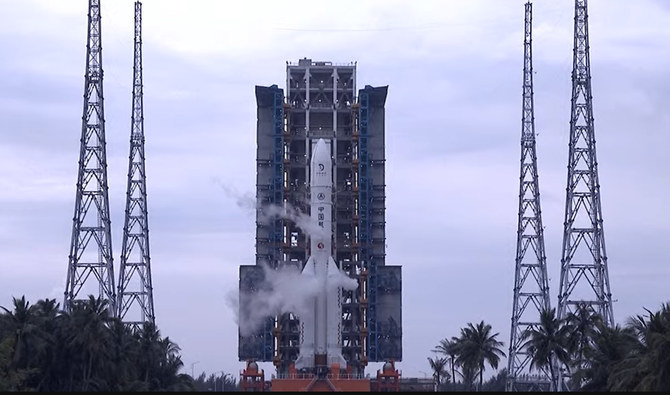
- ICUBE-Q was deployed in moon’s orbit around 1:14 p.m. Pakistan Standard Time, says Institute of Space technology official
- IST official describes development as “important” one for Pakistan allowing it to conduct “bigger” space missions in future
Islamabad: Pakistan’s first lunar satellite ICUBE-Q entered the moon’s orbit successfully today, Wednesday, a senior official of the country’s Institute of Space Technology (IST) confirmed, saying the “important” development could pave the way for “bigger” space missions for the country in the future.
The ICUBE-Qamar satellite carries two optical cameras to image the lunar surface and weighs around 7kg. Cubesats are tiny box-shaped satellites that are mainly launched into low Earth orbit to observe the Earth, test new communications technology, or perform miniature experiments.
Pakistan’s first lunar satellite was launched aboard China’s Chang’e-6 probe on May 3. The Chinese probe is tasked with landing on the far side of the moon, which perpetually faces away from the Earth, after which it will retrieve and return samples. China is the first country to make such an ambitious attempt.
“Our ICUBE-Q was deployed successfully in its orbit at 1:14 p.m. Pakistan Standard Time,” Dr. Khurram Khurshid, the head of the electrical engineering and computer science department at IST and a co-lead on the satellite project, told Arab News.
Dr. Khurshid said Pakistani officials will continue to test the satellite’s system for the next three to four days. He said initial tests revealed there were no complications with the cubesat’s system.
The IST official said the development means Pakistan is officially in an exclusive club of countries that have conducted deep space missions.
“This is the first step, a step in the right direction,” Dr. Khurshid noted. “It can lead to bigger space missions, such as landing on the moon or various other experiments.”
Dr. Khurshid said Pakistan would be able to share images from the satellite by May 15.
Around 100 students from IST contributed to developing the satellite. Pakistan’s proposal to build the satellite was accepted by the China National Space Agency (CNSA) from plans submitted by eight member states of the Asia-Pacific Space Cooperation Organization (APSCO).
The design, development, and qualification of the ICUBE-Q satellite were spearheaded by faculty members and students of the IST in collaboration with China’s Shanghai Jiao Tong University (SJTU), with support from Pakistan’s National Space Agency, SUPARCO.
The ICUBE-Q has two cameras as payload for taking images of the lunar surface that will be transmitted back to Earth for analysis.










